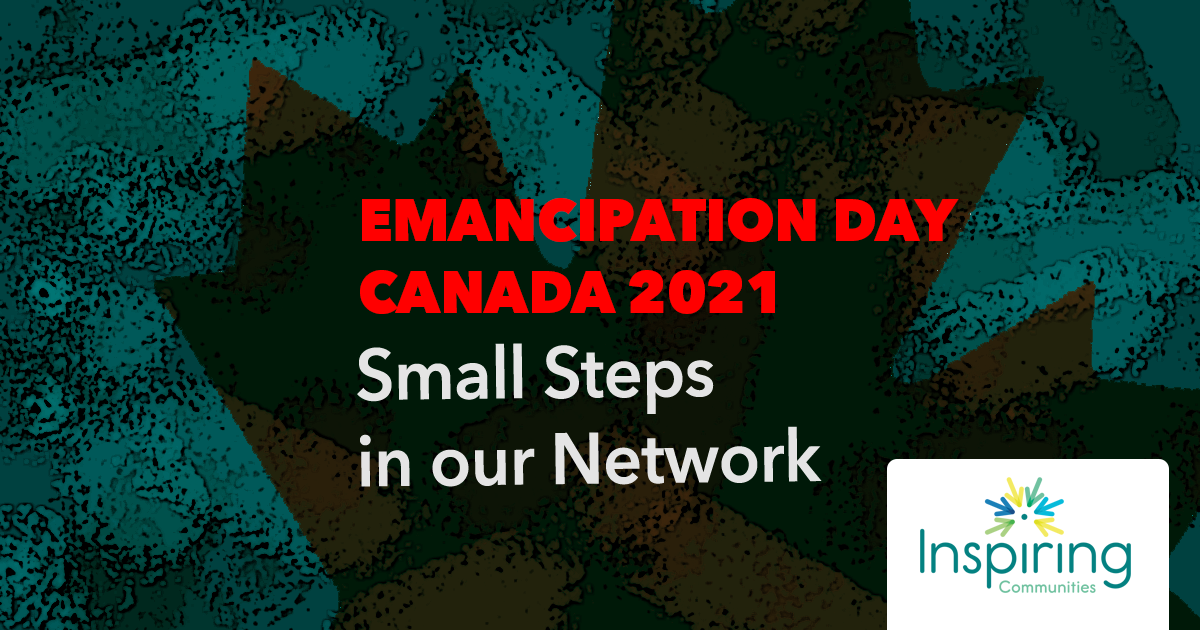Acknowledging Small Steps in our Network

Inspiring Communities’ Content Curator reflects on Emancipation Day in light of our recent Impact Report.
Canada has long enjoyed the perception that our race issues are ‘not so bad’ compared to our southern neighbors. There is still a lingering belief that slavery didn’t really happen here. In this well-researched explanation of Emancipation Day in Canada from the BC Black History Awareness Society, two of the specific examples come from Nova Scotian archives – a slave selling ad placed in a Halifax newspaper, and an ad from Digby looking for two runaway slaves.
That is uncomfortably close to home.
In March of 2021, the Canadian government designated August 1 as Emancipation Day, recognizing the day in 1834 when the Slavery Abolition Act took effect. In April of this year, it was formally announced that August 1 would be designated Emancipation Day in Nova Scotia in recognition of the history and impacts of slavery in the province.
Minister Tony Ince was quoted:
The institution of slavery was foundational to the history of systemic anti-Black racism that has impacted people of African descent in Nova Scotia for generations,” said Mr. Ince. “Celebrating Emancipation Day is one way to encourage all Nova Scotians to recognize and reckon with the legacy of anti-Black racism and honour the contributions of Nova Scotia’s historic Black communities as we work to build a more equitable future.
– Tony Ince, Minister of African Nova Scotian Affairs and the Office of Equity and Anti-Racism Initiatives
After several years of hearing debates about statues and re-learning history characterized as “rewriting history”, these lines from the BC Black History Awareness Society article are refreshing:
“Emancipation Day is about learning Canada’s collective history — not rewriting that history but telling a more complete history that includes the history of slavery….Canadian history is taught in schools from a Eurocentric perspective that omits or minimizes the human rights violation against African Canadians.”
Historiography is a process of re-examining what has come before, in light of different evidence or with different lenses. Historians literally rewrite history all the time, often in the context of different present-day needs. The racism that weaves through our historical record is a part of history. That is a fact; the way we talk about it is subject to change.
As we at Inspiring Communities work with people across the region to ignite collective impact and foster systems change, we recognize the effects of colonialism and anti-Black racism daily. Across our network, we have been actively seeking out learning partnerships and opportunities to surface our own biases and build a more inclusive and equitable organization. This aligns with our principles, particularly being aware of power and privilege, addressing inequity and learning from each other.
The Nova Scotia Network for Social Change reported in our 2020-2021 Impact Report on learning sessions they offered to our network and beyond:
NSN4SC and NS GovLab team offered 10 learning sessions to partners including three specialized sessions within the IC network in May, June and July of 2020. They also offered educational opportunities to the broader NSN4SC membership, facilitating sessions with Department of Seniors staff and partners, plus a session for Provincial government staff.
In July, they published a statement of their commitment to take a stand against racism, which included this:
“Our team has been actively identifying and examining our own complicity in systemic racism. We recognize the systemic racism within the social innovation sector. We are committed to increasing our actions to examine, identify and stop complicity in our own work and the work of the social innovation sector. We are actively embedding equity, anti-oppression, anti-racism, and decolonial principles in every aspect of our work.”
-GovLab & NSN4SC
We proactively sought out ways to extend our work into traditionally Black communities. In the spring, we were honoured to share our Wayside platform with the East Preston Empowerment Academy, which worked with Dr. LeQuita Porter to offer a public speaking and confidence building course, primarily intended for African Nova Scotians. This partnership opened us up to learning a different approach to learning. We also welcomed an opportunity to partner with the Community Sector Council to introduce and raise awareness of the new BBI initiative, the Diversity Employment Network.
Some of our staff took part in the Community Sector Council’s excellent Black History Learning Journey education series. The recordings are available on their site and they have a part 2 coming this Fall.
These are small steps, for sure, but in each case, we hope the foundation we are building will lead to the next step, and the next. We continue to learn, to stumble, and to remain humble in the journey.
Share this:
Comments are closed